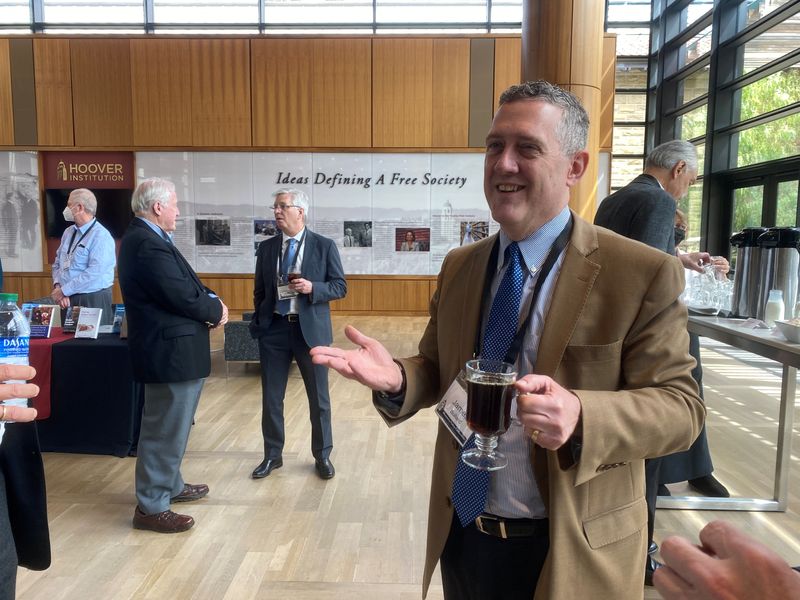By Michael S. Derby and Ann Saphir
(Reuters) -St. Louis Federal Reserve President James Bullard, a leading hawk at the U.S. central bank who pushed for aggressive interest rate hikes to curb high inflation, will leave the Fed regional bank next month to join Purdue University's business school.
Bullard, who has led the St. Louis Fed since 2008 and is the Fed's longest-serving current policymaker, will stay on in an advisory role at the regional bank until Aug. 14 before taking up a post as the inaugural dean of the Mitchell E. Daniels, Jr. School of Business at the university in Indiana.
He will not take part in the policy deliberations or the rate-setting decision at the Federal Open Market Committee's meeting on July 25-26, according to a statement from the St. Louis Fed.
Bullard was in the vanguard of Fed policymakers calling for action to rein in a surge in inflation in the run-up to the launch of the Fed's tightening campaign in March 2022, and has maintained a hawkish posture in his public pronouncements.
He will leave the Fed as it moves toward the endgame of its tightening cycle. The central bank is expected to boost rates at its meeting this month, but with inflation showing clear signs of cooling, it's unclear what will happen after that point.
"I think this (Bullard's departure) doesn't have a lot of near-term implications," said Tim Duy, chief U.S. economist at SGH Macro Advisors. "The Fed is going to move ahead with its July rate hike, and September and October is up in the air, depending on the economy."
Duy added that "longer-term, you are pulling somebody who has been recently a reliable hawkish voice out of the discussions, but he was not always hawkish, and he certainly would shift as conditions did."
CLOSELY WATCHED
Bullard, 62, has been at the Fed for the bulk of his career, joining as an economist in 1990. He was his regional bank's research director before taking over the leadership slot. He said in the statement released by the St. Louis Fed that the regional bank "is well-positioned for ongoing success and impact."
Derek Tang, an analyst with LH Meyers, a research firm, said "Bullard was a maverick force on the FOMC, testing the consensus assumptions with intellectual heft." He added that "pre-COVID, he often called for moderation in hiking, but in this episode, he was out in front on the inflation issue and challenged his colleagues to tighten policy sooner and faster."
Unlike many central bankers, Bullard has been both a strong hawk and dove at various points in his tenure, sharing those views in regular speeches and media appearances. In a press release from Purdue University, the school cited an Economist magazine report that had listed him as the world's 7th most influential economist. Bullard's views have often been cited as being particularly market-moving.
Bullard's public comments were often academic in nature. In 2019 he signaled his openness to become Fed chair if the opportunity arose.
While Bullard did not have an FOMC vote this year due to the annual rotation of regional bank presidents, among current officials only the leader of the Minneapolis Fed has cast more dissenting votes, according to data from Wrightson ICAP (LON:NXGN).
In 40 votes, Bullard cast three dissents favoring an easier policy stance relative to colleagues, and one that was more hawkish than the FOMC consensus. His last dissent was at the March 2022 gathering, when he wanted a bigger rate rise to start off the tightening campaign relative to what other Fed members favored.
Kathleen Bostjancic, chief economist at Nationwide, said his exit is "a loss to the FOMC, since he has great institutional knowledge and a deep understanding of the economy and how monetary policy can affect it."
Bullard faced mandatory retirement at the Fed in February 2026, given central bank rules that compel retirement at 65, with some exceptions, according to the Brookings Institution.
The St. Louis Fed said Kathleen O'Neill Paese, the regional bank's first vice president and chief operating officer, will act as interim president. The St. Louis Fed's board of directors will form a search committee to replace Bullard.
The regional bank said its search committee will look nationally for a new leader, noting that its search will be "robust, transparent, fair and inclusive." The Fed has faced considerable outside pressure in recent years to draw leaders from a broader pool, and the selection process for regional Fed leaders has long been dogged by critics for a lack of openness.
The Fed's annual report for 2021 said Bullard was paid $416,300. While they operate under the oversight of the Board of Governors in Washington, regional Fed banks are quasi-private institutions technically owned by member banks.
With Bullard's exit, there will be two unfilled regional Fed bank slots. The Kansas City Fed is also searching for someone to replace its former president, Esther George, who retired earlier this year.
